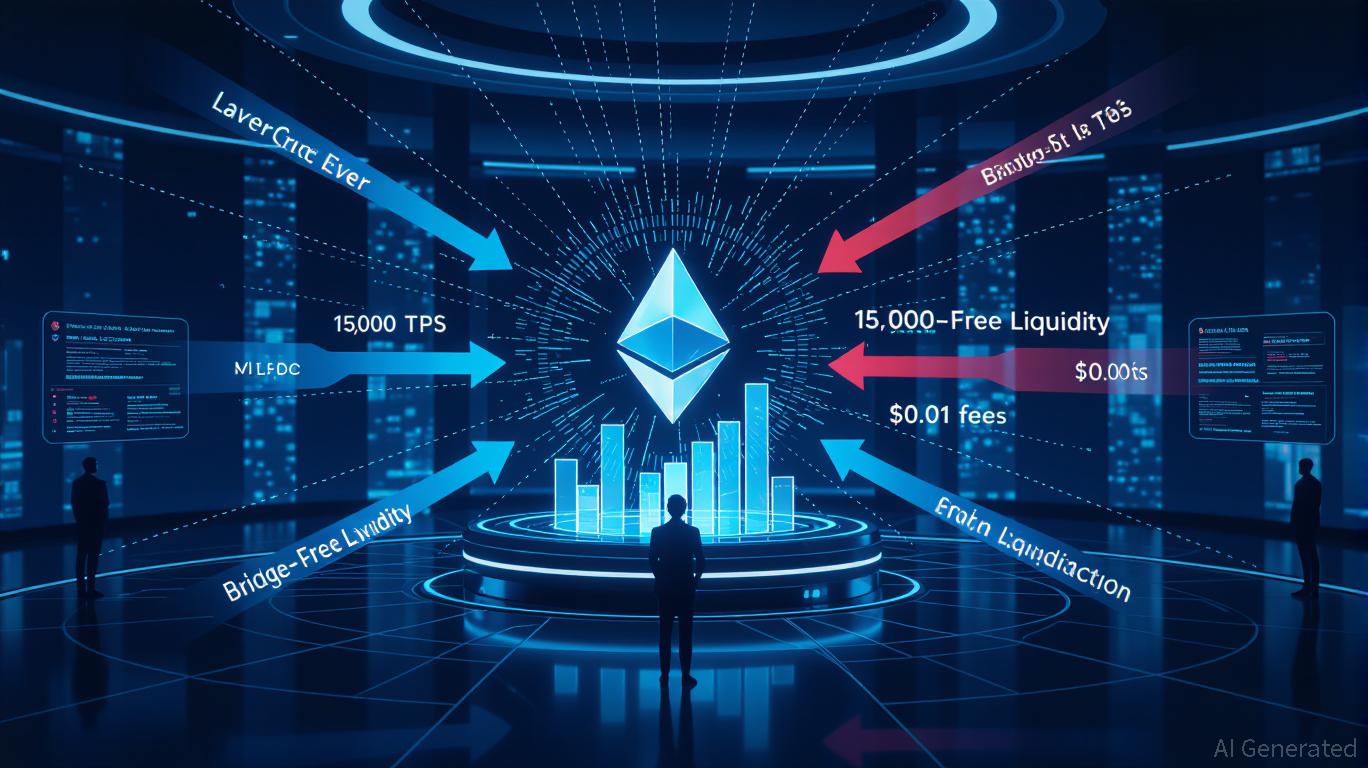ZK Atlas Enhancement: Transforming Blockchain Expansion and the Next Era of DeFi
- ZKsync's ZK Atlas Upgrade (Oct 8, 2025) addresses blockchain scalability and interoperability via modular Layer 2/3 infrastructure. - Achieving 15,000 TPS with RISC-V Airbender prover, it enables near-zero fees and direct Ethereum liquidity access, enhancing DeFi adoption. - ZK token surged 50% post-upgrade, while projects like Grvt raised $19M to leverage its infrastructure, signaling institutional confidence. - Challenges include regulatory uncertainties and legacy system integration, though modular de
Technical Innovations: Ushering in a New Scalability Era
The
One of the standout features is interoperability. By granting Layer-2 solutions direct access to Ethereum’s liquidity, the upgrade removes the need for centralized bridges—a common weak point in cross-chain transactions, according to the Bitget report. This bridge-less design not only strengthens security but also paves the way for institutions to bring trillions in previously illiquid assets, such as property and commodities, onto the blockchain.

DeFi Adoption: Unlocking Trillions in Value
This upgrade is set to make a significant mark on DeFi. By supporting secure, cost-effective tokenization of RWAs, ZK Atlas acts as a bridge between conventional finance and decentralized platforms. For example, institutional-level tokenization of assets like real estate or infrastructure bonds could open up previously restricted markets, drawing in both retail and institutional investors.
Additionally, the modular architecture of the upgrade fits well with Blockchain-as-a-Service (BaaS) models, enabling businesses to gradually implement ZK solutions without needing to replace existing systems, as outlined in the Bitget report. This flexible, “plug-and-play” setup lowers barriers to entry, especially in industries such as supply chain logistics and lending backed by assets.
Market Implications: Price Surges and Institutional Bet
The upgrade’s anticipated benefits have already been reflected in the market. The native ZK token experienced a 50% price jump after the upgrade, signaling strong investor belief in its scalability and business applications, as noted in the Bitget report. Furthermore, initiatives like Grvt have secured $19 million to adopt ZKsync’s infrastructure, indicating rising institutional engagement.
Nonetheless, some obstacles remain. Regulatory ambiguity, particularly concerning RWA tokenization and international compliance, continues to pose challenges. Moreover, integrating ZK technology with existing systems demands specialized knowledge, which could slow uptake in more traditional industries, according to the Bitget report.
Challenges and Mitigations
Despite its advantages, the ZK Atlas Upgrade still faces hurdles. Regulatory standards for tokenized assets are still developing, and large-scale interoperability with non-EVM blockchains has yet to be proven. However, ZKsync’s modular design and support for BaaS solutions help address these issues by allowing gradual adoption and reducing upfront costs for companies, as emphasized in the Bitget report.
Conclusion: A Catalyst for the Next Crypto Cycle
The ZK Atlas Upgrade marks a turning point for blockchain technology. By overcoming scalability limits and fostering secure, affordable DeFi environments, it sets the stage for widespread adoption. For investors, this means new prospects within the ZKsync ecosystem, RWA tokenization ventures, and infrastructure providers like Grvt. While some risks persist, the upgrade’s robust technical foundation and growing institutional support suggest it could play a pivotal role in the upcoming crypto market surge.
Disclaimer: The content of this article solely reflects the author's opinion and does not represent the platform in any capacity. This article is not intended to serve as a reference for making investment decisions.
You may also like
Cardano News Today: Balancing Privacy and Regulation: Three Cryptocurrency Initiatives Transforming the Industry
- Privacy-focused blockchains gain traction as Zcash (ZEC) surges 1,172% YTD, leveraging zk-SNARKs for 20-25% shielded transactions. - Midnight (MIDNIGHT), a Cardano-based privacy sidechain, combines GDPR compliance with hybrid consensus, attracting institutional interest since 2023. - Cardano (ADA) expands DeFi ecosystem with $500M+ TVL, aligning privacy-first vision with 2025 regulatory clarity to boost institutional adoption. - Privacy coins like Zcash and Midnight reflect growing demand for confidentia

Bitcoin Updates: Surge in Stablecoin Deposits Signals a Bullish Shift for Bitcoin
- Binance's 102.11% Bitcoin reserve ratio and $41B stablecoin inflows in Q3 2025 signal strong liquidity amid bullish market conditions. - Historical patterns show Bitcoin's current liquidity setup mirrors pre-2020 rally conditions, with SSR at 13 indicating potential price rebounds. - Analysts project $110,000-$115,000 targets for Q1 2026, but caution structural support at current levels could precede deeper corrections.

Operational challenges and disagreements among investors have cast uncertainty over Cloud IP's projections for 2028
- International Paper (IP) reports $1.1B Q3 loss despite $6.22B sales, with 2025 net sales projected at $24B amid mill reliability challenges. - Extended Sylvamo supply agreement through 2026 highlights asset optimization but raises execution risks as Riverdale Mill conversion threatens supply chain stability. - Institutional investors show mixed stances: Resona increased 9.5% stake while BMO cut holdings by 26.5%, reflecting uncertainty over -381.30 P/E ratio and 4.9% dividend yield. - Analysts remain spl

Ethereum Updates Today: Aero Connects Blockchains as DeFi Moves Entirely On-Chain
- Aerodrome and Velodrome merge to form Aero, a cross-chain DeFi hub launching Q2 2026, unifying Ethereum Layer 2 liquidity and expanding to mainnet and Circle's Arc blockchain. - AERO token allocation reflects Aerodrome's 94.5% TVL dominance ($479M vs. Velodrome's $55M), balancing stakeholder incentives while avoiding over-dilution per DeFi governance experts. - Aero introduces arbitrage revenue capture, zero-knowledge integrations, and a unified cross-chain interface, aiming to capture 10-15% of Layer 2
